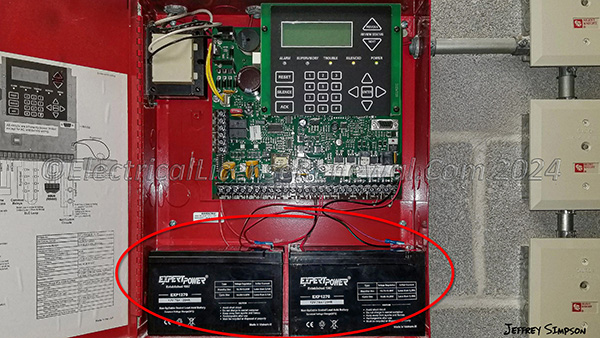Power Supply Considerations.

Reliable power supply is critical for the proper operation of fire alarm systems. These systems rely on both primary and secondary power supplies to ensure continuous operation, even during power outages. The primary power supply is typically sourced from the building's electrical system, providing the main source of power to the fire alarm control panel (FACP) and all connected devices.
In the event of a primary power failure, the secondary power supply, usually in the form of batteries or an emergency generator, takes over to maintain the system's operation. NFPA 72 Sections 10.6.7.2.1 and 10.6.7.2.2 specify that the secondary power supply for the protected premises system shall have sufficient capacity to operate the system under quiescent load (system operating in a nonalarm condition) for a minimum of 24 hours, followed by 5 minutes of full alarm operation with all alarm notification appliances used for evacuation or to direct aid to the location of an emergency. This ensures that the system remains functional during extended power outages.
The requirement specified in NFPA 72 Sections 10.6.7.2.1 and 10.6.7.2.2 ensures that the fire alarm system remains operational during a power outage by switching to a secondary power supply, typically batteries or an emergency generator. This has the following benefits, which help to prevent false alarms:
- Consistent Power Supply: By ensuring that the system can operate for at least 24 hours under quiescent load and then for 5 minutes in full alarm condition, the system is less likely to experience power fluctuations or interruptions. These fluctuations are a common cause of false alarms.
- Stable Operation: Continuous and stable power allows the fire alarm system to maintain its normal operating conditions, ensuring that sensors and detectors function correctly. Unstable power can cause sensors to give erroneous readings, leading to false alarms.
- Avoidance of Malfunctions: Power outages and the subsequent power surges when power is restored can cause malfunctions in fire alarm systems. With a reliable secondary power supply, the system avoids these disruptions, reducing the chances of false alarms.
- Reduced Nuisance Alarms: During a power failure, a reliable secondary power supply ensures that the system does not interpret the loss of power as a fault or an alarm condition. This reduces the likelihood of the system generating nuisance alarms during such events.
- Maintained Monitoring and Diagnostics: The secondary power supply ensures that the system's monitoring and diagnostic functions remain active during a power outage. Continuous monitoring helps in identifying and addressing potential issues before they result in false alarms.
Overall, the secondary power supply's capacity to keep the fire alarm system operational under both quiescent and alarm conditions ensures the system's reliability and reduces the likelihood of false alarms, particularly during power outages and transitions between power sources.
The battery backup system is a common choice for secondary power. It typically includes rechargeable batteries that are constantly charged by the primary power supply. Regular testing and maintenance of the battery system are essential to ensure it can provide adequate power when needed. This includes checking battery voltage, ensuring proper connections, and replacing batteries as needed.
Surge protectors and power conditioners are also important components of the power supply system. They protect the fire alarm system from power surges, spikes, and electrical noise that could cause damage or false alarms. Ensuring proper grounding and using high-quality power supplies can further enhance the reliability of the system.
Understanding and implementing robust power supply considerations are crucial for ensuring the continuous and reliable operation of fire alarm systems. Installers and maintenance personnel must be vigilant in maintaining both primary and secondary power supplies to prevent system failures and ensure the safety of building occupants.